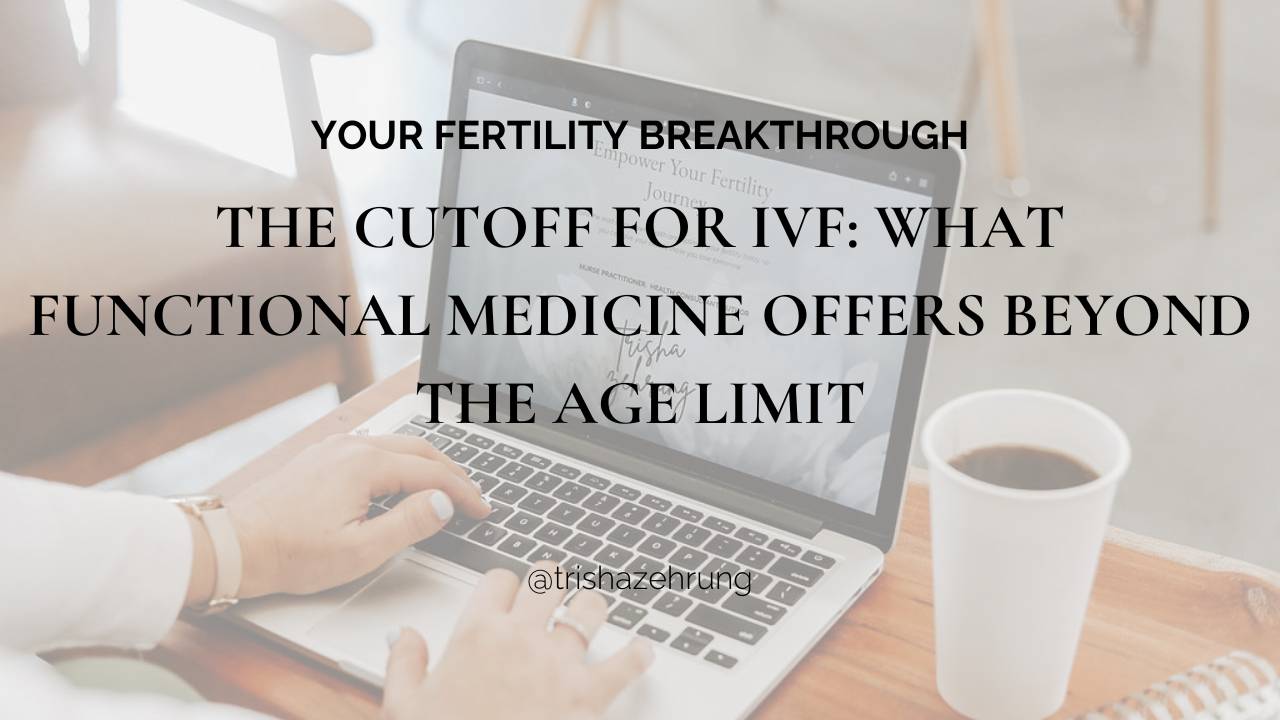
The Cutoff for IVF: What Functional Medicine Offers Beyond the Age Limit
In most fertility clinics, age becomes a defining number.
Once you reach your 40s—sometimes even your late 30s—you may hear terms like “diminished ovarian reserve” or “you’ve missed your window.” Some clinics even have a cutoff age for IVF, typically between 42 and 45, depending on their protocols.
But is age the only story?
In functional fertility care, we believe God designed the body with resilience, intelligence, and the ability to respond to the right kind of care. Age is a factor—but it’s not the final word.
Let’s talk about what traditional IVF doesn’t always consider… and what’s possible when we work with the body instead of against it.
What Is the Cutoff for IVF?
Most IVF clinics set a cutoff for treatment somewhere between:
- 42–45 years old (using your own eggs)
- Up to 50 (using donor eggs)
Why the limits?
The answer lies in statistics. Fertility success rates decline with age, and clinics often aim to protect their numbers. That means if you fall outside their defined parameters, you may be offered donor eggs—or told you’re out of options entirely.
But IVF success rates don’t always reflect individual potential. That’s where functional medicine fills the gap.
Functional Medicine Looks at More Than Just Age
In functional fertility care, we don’t treat you like a number on a chart. Instead, we ask deeper questions:
- What is your hormonal health telling us?
- How is your ovarian environment functioning?
- Are your mitochondria, which fuel egg quality, getting the nutrients and support they need?
- What stress, inflammation, or toxic load might be interfering with your cycle?
Instead of assuming fertility ends on a certain birthday, we uncover the root causes that impact your unique fertility window—and we help you expand it naturally.
How Functional Medicine Supports Fertility After 35 (and Beyond)
Here’s what we focus on to keep your fertility window open longer:
1. Mitochondrial & Egg Health
Eggs are cells—and like all cells, they rely on mitochondria for energy. As you age, mitochondrial function can decline. But with support, you can nourish and energize your eggs using:
- CoQ10 (Ubiquinol) for mitochondrial output
- Antioxidants to reduce cellular damage
- B Vitamins to support methylation and detox
2. Hormonal Balance
As women age, it’s not just the ovaries that change—it’s the entire endocrine system. Functional care evaluates:
- Cortisol (stress hormone)
- Insulin resistance
- Estrogen and progesterone levels
By balancing these hormones naturally, we often see healthier ovulation patterns and stronger luteal phases—both essential for conception.
3. Cycle Literacy + Timing
When you understand your cycle and ovulation signs, you can optimize timing and avoid missing your fertile window—even if your cycles are irregular. We teach body literacy tools like:
- Cervical mucus tracking
- Basal body temperature (BBT) charting
- Cycle syncing with nutrition and lifestyle rhythms
You’re Not Too Old—You May Just Need a New Strategy
We’ve worked with women in their early 40s who were told IVF was their last chance… only to conceive naturally after supporting their body’s biology.
Is that every story? No. But it's one the conventional system doesn’t always make room for.
Faith-based functional fertility care gives you space to hope, time to heal, and a personalized approach that aligns with how your body was made to function.
Where Science Meets Stewardship
Our belief is simple: Your fertility is not broken. It just may need support.
At Trisha Zehrung Fertility Consulting, we combine clinical insight with Biblical encouragement—guiding women with faith, functional lab testing, and practical tools that work.
Want to Know What Your Fertility Window Really Looks Like?
If you’ve been told your time is up, we’d love to give you a second opinion rooted in compassion and science.
Book a free discovery call to explore your next steps—from targeted labs to customized protocols designed to extend and optimize your natural fertility.

